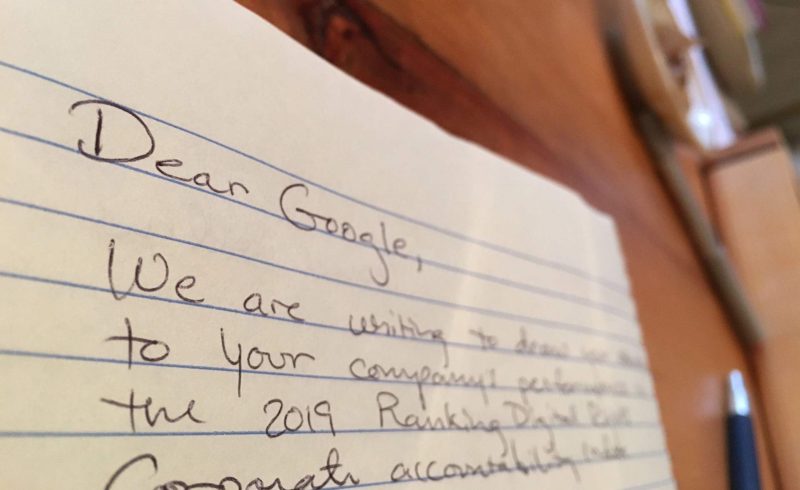Posted at 02:14h
in
Featured,
News
by Jan Rydzak
Download: Ranking Digital Rights’ response to Facebook on the Oversight Board bylaws, trust, and human rights review

Shutterstock
Today, Facebook released the highly anticipated bylaws for its Oversight Board, the soon-to-launch independent body that will allow users to appeal the company’s content moderation decisions before independent panels of policy experts.
We at RDR think this experiment in internet governance shows real progress toward new models of content moderation that protect and promote human rights. The bylaws reflect improved remedy with binding results, establish commitments to disclose data, and implement some of the recommendations of a third-party human rights review commissioned by Facebook. At the same time, they reveal that much work remains to be done for these models to succeed and endure. Universal human rights principles should play a central role in the Oversight Board’s processes and structures, and its scope should extend to Facebook’s due diligence mechanisms and algorithmic oversight.
The release of the bylaws follows last month’s announcement that the Oversight Board will operate under an independent trust and the publication of a third-party human rights review of its creation and prospective operations, conducted by BSR. Today, we are publishing a full response to all three developments.
Facebook’s Oversight Board (sometimes referred to as Facebook’s ‘Supreme Court’) has been a long time coming. The company has faced a barrage of criticism in recent years for its lackluster responses to hate speech, disinformation campaigns, and attempts to incite violence through the platform, among other content issues. RDR itself has pushed hard for greater transparency around the company’s Community Standards, which govern what can and cannot be expressed on the platform. There have also been calls for greater transparency around the mechanisms controlling how some voices are amplified on Facebook while others are silenced or obscured.
The Oversight Board, first announced by CEO Mark Zuckerberg in a 2018 blog post, will seek to address some of these shortcomings by offering a binding grievance mechanism unswayed by Facebook’s influence.
In May 2019, reflecting on the Oversight Board’s draft Charter, we argued that the creation of an independent governance and appeals mechanism for content moderation is both critical and timely. The 2019 RDR Index revealed profound gaps in Facebook’s remedy and grievance mechanisms, which were among the weakest of any ranked company. RDR has strongly advocated for Facebook to incorporate the Santa Clara Principles on Transparency and Accountability in Content Moderation into its appeals processes, thus embracing a roadmap to a system of remedy grounded in human rights principles.
The Oversight Board’s newly released bylaws show signs of progress toward an appeals mechanism – a way for users to formally appeal Facebook’s decisions to remove or preserve controversial pieces of content – that may really work in practice. Targeting some of the weaknesses RDR has identified in Facebook’s existing remedy processes, they provide clear timeframes for most aspects of the Oversight Board’s operations and elaborate on the data that will be disclosed as the Oversight Board carries out its mandate. These are promising developments in the direction of transparency and accountability.
But there is significant room for improvement. First and foremost, human rights norms could play a much larger role in both the bylaws and the Charter. From the inception of Facebook’s public consultations on the Oversight Board, RDR has pressed for the Board to be anchored in universal human rights principles, which apply to companies through the UN Guiding Principles on Business and Human Rights. These norms should be a core component of the Oversight Board’s work and permeate its operations, as independent experts have argued repeatedly. We recognize the progress from the draft Charter, which makes no reference to human rights norms, to the final Charter and bylaws, where the Board’s decision-making process includes assessing the impact of content removal on the right to free expression. But this neither covers the full spectrum of human rights nor equates to accepting human rights principles as the cornerstone. Facebook has made a commitment to human rights norms through its membership in the Global Network Initiative, whose Principles are grounded in them. The company should embrace and reiterate this commitment in every new endeavor, including the Oversight Board.
The bylaws also fail to adequately acknowledge the role of algorithms in promoting and amplifying problematic speech. In our present online reality, where platforms are no longer limited to keeping content up or taking it down, the Oversight Board should also have input on other decision-making options available to Facebook, including demotion and other algorithmic changes to the visibility of content. The Oversight Board should be able to issue these and other advisory opinions without having to be prompted by Facebook.
In December, Facebook also announced the creation of an independent trust tasked with supporting the regular operations of the Oversight Board, and shared an independent human rights review of the emerging body. RDR welcomes both announcements. We have long advocated for mechanisms that would ensure the Oversight Board’s independence from Facebook. Yet the risk of bias remains, as Facebook alone is responsible for selecting and appointing the trustees as well as the initial officers of the Oversight Board.
We also commend Facebook for commissioning a human rights review – and for sharing it publicly prior to the launch of the Oversight Board. Human rights impact assessments and similar, structured due diligence mechanisms are in short supply across the industry. This publication has the potential to change that precedent and lay a foundation for best practice. We also encourage Facebook to imbue the Oversight Board with the authority to provide advice on the company’s broader due diligence processes as they develop.
Facebook has accepted a great challenge in setting up the Oversight Board – it is putting forth a structure with the potential to set new norms for the governance of content moderation, not only on its own platform but across the internet. Given its dominant role in the industry as an enabler of online speech for billions of people across the globe, it is critical to get it right the first time. We welcome Facebook’s increased commitment to transparency and accountability. At the same time, the company should take note that this commitment will only take the Oversight Board so far in the absence of an explicit anchoring in universal human rights, which should underpin its design, launch, and evolution.










